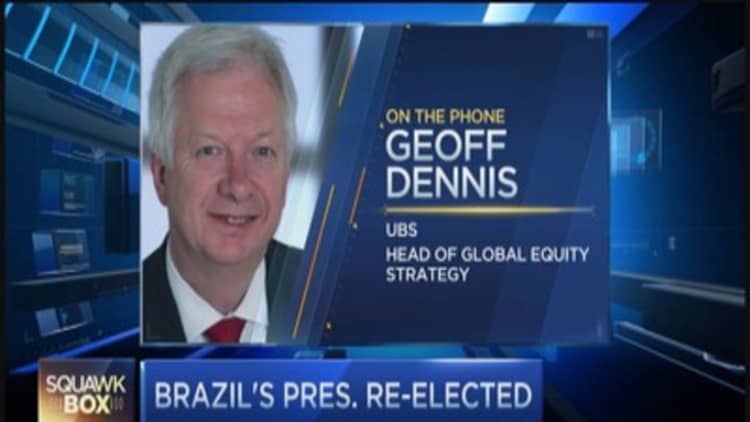Brazil's central bank raised interest rates on Wednesday, surprising investors with a move that signals President Dilma Rousseff could make more market-friendly policy changes after her narrow re-election victory on Sunday.
In a divided vote, the central bank's board decided to raise its benchmark Selic rate by 25 basis points to 11.25 percent. All 43 economists surveyed in a Reuters poll this week expected the bank to keep the Selic at 11 percent.
With the hotly contested presidential race over, the central bank moved swiftly to anchor inflation expectations at a time when markets are doubtful Rousseff is willing to overhaul her policies to regain the trust of investors.
The bank said the balance of inflation risks has become less favorable since its last rate-setting meeting in early September due to more intense price increases.
"In light of that, the committee considered it appropriate to adjust monetary conditions in order to guarantee, at a lower cost, the prevalence of a more benign inflation outlook in 2015 and 2016," the bank said in its statement.
Read MoreBrazil's election celebration could be short-lived
Five of the eight board members voted to raise the Selic, and the other three voted to keep it unchanged.
"This definitely is a great step forward to rebuild the credibility of the inflation-targeting regime. Very well done," said Alberto Ramos, senior economist with Goldman Sachs in New York. "This is market friendly. Whether this means other (market-friendly) steps will come, only time will tell."
Inflation hovering above the official target ceiling of 6.5 percent has raised pressure on the central bank to raise borrowing costs. The central bank aims to keep inflation at the center of the target, between 2.5 percent and 6.5 percent.
Still, most economists had expected the bank to refrain from action until Rousseff announces changes to her economic team.
Rousseff has pledged policy changes to reverse economic weakness that cost her support among Brazil's middle class in the tight race against market darling Aecio Neves.

Read MoreWatch out! Brazil markets slide after elections
Game changer?
The leftist leader is considering a close aide or a business executive to replace Finance Minister Guido Mantega, who will step down at the start of her second four-year term on New Year's day.
Some of the central bank board members could also be replaced in a second term, according to local media.
Brazilian exchange and stock markets have been volatile since Rousseff's re-election victory on Sunday, with some investors hopeful that the threat of a credit downgrade could force her to adopt more business-friendly policies.
Read MoreLeftist Rousseff narrowly wins second term in Brazil
"This change in monetary policy may be interpreted as a possible change in economic policy in general," said Jankiel Santos, chief economist for Espirito Santos Investment Bank in Sao Paulo. "The bank will not stop here, this should be the start of a new tightening cycle."
The surprise hike could also pave the way for the government to raise fuel prices, helping state-run oil company Petrobras recover from policies that have forced it to sell imported fuel at a loss to cap inflation, analysts say.
The most urgent task facing Rousseff's new economic team will be tightening the federal budget to ward off the threat of a credit downgrade next year.
Less public spending in 2015 would ease inflationary pressure and allow the central bank to opt for a shorter rate tightening cycle.
Central bank chief Alexandre Tombini has warned that the bank will not be complacent and that it was ready to resume a year-long tightening cycle if needed to bring down inflation. The bank forecasts inflation to stay high in the next two years, but gradually move back to the target's center.
Read MoreStay far, far away from Brazil: Dennis Gartman
The central bank drastically cut rates to record lows in 2012, but was forced to raise them again following a jump in public expenditures and after a severe drought caused electricity prices to rise, accelerating inflation.

